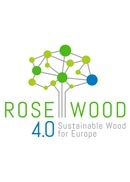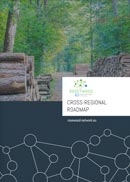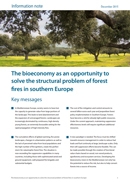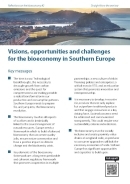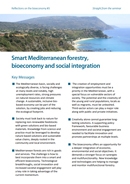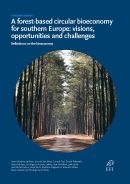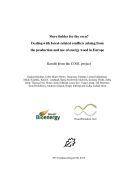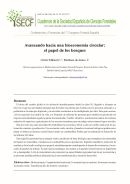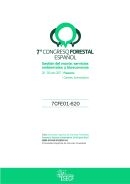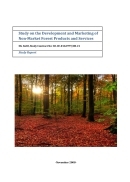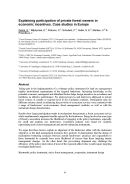|
ROSEWOOD4.0 Map Viewer Knowledge platform for regional forest innovation The ROSEWOOD Map Viewer shows over 100 Best Practices and 30 Innovation cases in sustainable wood mobilisation collected by project partners. Among the cases featured are exemplary products, business concepts and ideas from the entire wood value chain, from novel services to digitalise forest management to the innovative re-utilization of used wood for new window frames.
|
|
|
ROSEWOOD4.0 training Training courses and learning materials ROSEWOOD4.0 elaborated training courses and learning materials with the aim to promote innovation in the European forestry sector and to bring to different stakeholders all the tools to acquire new skills and help consolidating the digital transformation of the wood value chain.
|
|
|
ROSEWOOD4.0 roadmaps Roadmaps of best practices and innovations The ROSEWOOD4.0 Hubs elaborated 5 regional roadmaps and one cross-regional roadmap for the targeted transfer of best practices and innovations in wood mobilisation. Based on an overall assessment of regional wood mobilisation, scrutinising weaknesses, strengths as well as opportunities, the roadmaps suggest for each region specifically, exemplary projects, initiatives and solutions from across Europe that could help making more of the available wood resources.
|
|
|
The bioeconomy as an opportunity to solve the structural problem of forest fires in southern Europe Reflections on the Bioeconomy #1 This detailed information note provides four key messages that explain the social, economic, and ecological drivers of southern Europe’s dangerous increasing risk of forest fires, and demonstrates how the bioeconomy could be an opportunity to strengthen local areas and mitigate the fire threat.
|
|
|
Visions, opportunities and challenges for the bioeconomy in Southern Europe Reflections on the Bioeconomy #2 Based on a seminar of the same name held in San Sebastián, Spain, on 28 September 2016, this two-pager describes the need for and key components of a long term, predictable and coherent regulatory framework to promote a bio-based economy in Europe.
|
|
|
Smart Mediterranean Forestry, Bioeconomy and Social Integration Reflections on the Bioeconomy #3 The bioeconomy implies a radical transformation in current production and consumption patterns and requires technological, business and social innovation at all levels. As highlighted at EFIMED Week 2016, this two-pager acknowledges the role of empowering people for a smart, innovative and socially inclusive bioeconomy.
|
|
|
A forest-based circular bioeconomy for southern Europe: Visions, opportunities and challenges Reflections on the Bioeconomy - Synthesis report This synthesis report draws on findings from published research papers, grey literature, and institutional reports, as well as the expertise of an array of leading researchers in the field of the bioeconomy, to analyse the challenges to and opportunities for developing a forest-based bioeconomy in southern Europe.
|
|
|
EFI Technical Report 98 Current Practices for Managing Forests for Bioenergy. More fodder for the oven? Dealing with forest-related conflicts arising from the production and use of energy wood in Europe. EFI Technical Report 98. 5: 29-32, 2015 The core objective of the COOL (COmpeting uses of fOrest Land) project was to analyse, compare and evaluate different forest management approaches and political strategies related to the issue of energy wood production in five European countries. This report provides an overview of these activities.
|
|
|
Conferences and Presentations at the 7th Spanish Forestry Congress Górriz-Mifsud, E., Martínez de Arano, I. 2017. Avanzando hacia una bioeconomía circular: el papel de los bosques. Cuadernos de la Sociedad Española de Ciencias Forestales 43:151-162. In the new, fossil-free paradigm of the bioeconomy, forests and forest management have an important role to play. This paper explores the conditions necessary in order to realize this potential: regional specificities must be recognized, political measures aligned, and development patterns incorporated in this transformational process.
|
|
|
Conferences and Presentations at the 7th Spanish Forestry Congress Górriz Mifsud, E., Montero, E., Olza, L., Marini-Govigli, V. 2017. Retos de la gestión forestal conjunta de propietarios privados. Actas del 7º Congreso Forestal Español. 12 págs. Plasencia. Joint forest management offers opportunities to reduce transaction costs and create consistent forest activities at the landscape scale in the face of widespread ownership fragmentation. With insights drawn from a literature review and three case studies in Navarra, Spain, this paper presents challenges to joint management derived from theories of social capital and innovation.
|
|
|
Conferences and Presentations at the 7th Spanish Forestry Congress Górriz Mifsud, E., Marini-Govigli, V., Bonet, J.A., Martínez de Aragón, J. 2017. Aspectos socio-económicos de la regulación de recogida de setas en Cataluña. Actas del 7º Congreso Forestal Español. 12 págs. Plasencia. Mushroom picking in Catalonia, Spain offers opportunities for rural people, but also poses some regulatory challenges. This analysis of the socio-economic variables of mushroom picking provides decision-makers with information on supply and demand, which could be incorporated into the design of political interventions.
|
|
|
Study on the Development and Marketing of Non-Market Forest Products and Services FORVALUE Project - DG AGRI, Study Contract No: 30-CE-0162979/00-21 This study summarises information on the classification, characterization, and valuation of non-market forest goods and services, intending to create a foundation for discussion and policy conclusions on the feasibility of application of economic instruments for encouraging and supporting them.
|
|
|
NEWFOREX project publication Górriz-Mifsud E., Mäntymaa E., Petucco C., Schubert F., Vedel S.E., Mantau U., Prokofieva, I., 2014. Explaining participation of private forest owners in economic incentives. Case studies in Europe. Proceedings of the Biennial Meeting of the Scandinavian Society of Forest Economics. Uppsala, Sweden, May 2014. Taking part in voluntary land management instruments implies certain motivations of private forest owners. Better understanding these motivations can help policymakers design incentives that are most likely to tempt participation from these owners. This study draws from interviews and surveys of private forest owners in Europe to explore which incentive mechanisms, and which preconditions of owners, are most likely to result in uptake and success.
|

